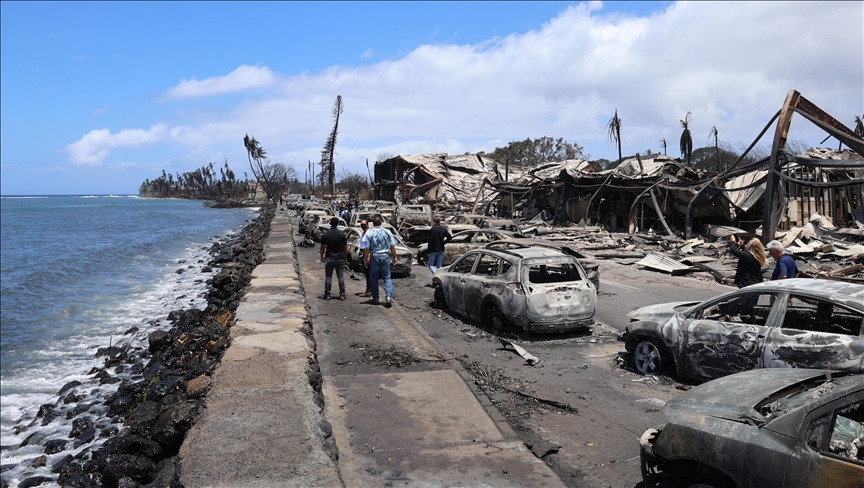

By Anadolu Agency
HOUSTON, US
More than 100 lives have been lost to the devastating wildfires that tore through parts of Hawaii, making it the deadliest inferno in the US in over a century.
Authorities warn the grim figure is certain to rise as search and rescue crews sift through swaths of ravaged land.
“It’s absolutely heartbreaking,” Jeanne Mariani-Belding, who was born and raised in Hawaii, told Anadolu.
“Lahaina is so much more than a popular tourist spot. It is an area rich in Hawaii’s culture and history, and for many, it is home.”
She said Hawaii residents are devastated by the loss of life and historical structures, but was optimistic that they will heal and rebuild after this disaster.
“People in Hawaii know how to come together and support each other. They are resilient and strong,” Mariani-Belding, who has moved to live full-time in California but frequently visits her island homeland.
“They also need our help now and through what will be a long recovery process.”
The wildfires started raging a week ago on both the Big Island and Maui, fueled by strong winds that have exceeded 60 miles per hour (96 kilometers per hour) from Hurricane Dora in the Pacific Ocean.
Experts said those gusts strongly contributed to the rapid spread of the fires.
“Hurricane Dora intensified the winds in the development stages of the Hawaii wildfires,” said Zong-Liang Yang, a professor at the University of Texas at Austin’s Jackson School of Geosciences.
“Even though Dora was hundreds of miles away, the hurricane was still a Category 4 storm and the winds were intense. Just like when a hurricane hits Houston, you can still feel the effects in Austin 150 miles (240 kilometers) away. You can still feel those heavy gusts of wind.”
Yang, who specializes in land atmosphere exchanges of energy and quantifying land climate interaction, said because the strong winds from Hurricane Dora were blowing in the same direction as the trade winds toward Maui – from northeast to southwest – that added extra fuel for the wildfires.
“The hurricane made a difference because both sets of winds were blowing in the same direction and joined forces,” Yang explained.
“They reinforced each other with the 60 mph (96 kph) winds from Dora combining with the already strong trade winds. Therefore, the winds were stronger and gustier, and that helped spread the fire and propagate the fire out of control.”
The blazes “increased in intensity and became even more fueled because the low pressure attracted the additional winds to trigger even stronger winds,” he added.
Hotter, dryer conditions
In addition, Yang said the already dry topographical conditions of Maui were ripe for a fire to rage out of control.
“People think of Hawaii as a rainforest, and that because it is surrounded by oceans, it is a wet climate. In reality, that is not always the case because the local conditions are affected by topography,” he told Anadolu.
“Lahaina is on the leeward side of the mountains, which means the winds climb over the mountains and blow downhill. When winds blow downhill, the air gets more compact and produces higher and dryer temperatures. Therefore, that location in Maui is always dry year-round.”
Yang added that temperatures in Hawaii have been unprecedentedly dryer and hotter than in previous years, making reference to the current scorching global temperatures, and emphasized that climate change and global warming definitely helped lay the groundwork for the devastating wildfires.
“In the scientific community, climate change and global warming have been at the forefront of our concerns,” said Yang.
“Scientists had warned of warming climate and heat waves from 20 years ago and because of those worsening circumstances, the storms are becoming more intensified and the chances of wildfires breaking out and spreading are becoming more frequent.”
People have to be really alert
Yang said wildfires in Hawaii will likely happen more often in the future, just as they have become more frequent in states like California, Washington and Colorado.
He also pointed to the recent Canadian wildfires and said the chances of blazes breaking out around the world will increase because of the current global climate situation.
“Heat, winds and dryness. The air is dry, the land is dry, and a few weeks of really hot temperatures; those are ripe conditions for fire,” he explained.
“People have to be really alert in that situation. The weather and climate conditions are conducive for fire.”
Recovery and rebuilding are the next steps for Hawaii’s residents as they try to piece together their shattered lives.
Mariani-Belding urged people across the US and around the world to please help with those efforts by contributing to the Hawaii Community Foundation, or making a donation to a Hawaii non-profit of their choice.
“While these historical structures are gone, I’m hopeful that the spirit and the culture will live on in our hearts and our memories,” she said.
“That is so important for future generations.”
We use cookies on our website to give you a better experience, improve performance, and for analytics. For more information, please see our Cookie Policy By clicking “Accept” you agree to our use of cookies.
Read More